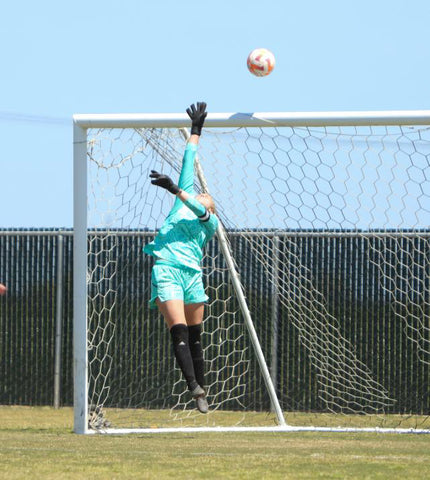Guest Blog: Becoming The Wall
From the IDA Team - Aubrey reached out to share her story and we thought what better time to highlight this important topic than during Mental Health Awareness Month. We hope you enjoy.

By Aubrey McLin | @thewallmclin
My name is Aubrey McLin and I am a high school sophomore soccer goalkeeper about to go into my 3rd WPSL season with the SF Nighthawks. I also play on a club ECNL soccer team and happen to have a chronic medical medical condition called POTS Dysautonomia. It’s an invisible condition because while you may look at me and think I’m healthy, my body is working much harder than the average person to maintain a healthy blood pressure and heart rate as well as keep control of my metabolic processes.
At the age six, I went from a typical healthy kid to a child who knew the ins and outs of the medical system before the age of 10. I was even able to start educating Urgent Care and Hospital staff on how to support a patient with my particular diagnosis. I think it’s safe to say that anyone in this circumstance would start to see a change in their mental health.

There were countless lab appointments and medical testing throughout my childhood. Many of these appointments and tests were painful (Electromyography, EMG, etc.) and seemed overwhelming, especially since some of the labs told my parents they could not have anyone that wasn’t part of the clinical team in the lab. Throughout all of this, no mental health support was offered or mentioned. You would think being diagnosed at the age of six with POTS (Postural Orthostatic Tachycardia Syndrome) Dysautonomia, a chronic and life long medical condition, that this would be one of the first things offered. As much as I was trying to stay positive and defy the odds and build the life I choose for myself instead of allowing my diagnosis to do that for me, there were some dark, low days.
Luckily, I had a circle of support outside my medical team and providers that did prioritize my mental health so I ended up receiving support. I should also note that 6-7 years ago mental health wasn't the topic it is today so that may be why it was not at the forefront of my physicians’ treatment plan and why I also never opened up about my mental health struggles with peers or anyone outside my immediate family. Things changed about two years ago regarding me staying quiet about the topic of mental health. I lost a friend and former teammate who took her life. And then, two weeks after her passing, a soccer mentor I had looked up to also took their own life. I felt completely numb. I know firsthand how fast and easy it is to get to a dark place and knew in that moment I wanted to be part of the progress, conversations, and efforts to help others.
My whole outlook on life shifted. I saw a need for getting more mental skills available and supports put in place to help student-athletes. Not just at the college level but for youth athletes. Student-athletes face a lot of pressure these days to take their game to the next level and try to balance this with school, family, and friends. I started to write about this as well as talk publically about common challenges student athletes face today. This led to my becoming a high school ambassador and freelance writer for both Female Footballers and Girls Soccer Network.
My drive for advocating for others [now] comes from my own personal experiences. I know first hand the difference one person can make. I wouldn’t be where I am today, playing soccer and living out my dreams, if it wasn’t for my parents, my team of doctors, my coaches, my trainers and my community who helped support and believe in me. I'm in a much better place and try to help others along the way.
To read more from Aubrey, check out her linktree and follow her on Instagram @thewallmclin.
For more on Goalkeeper Mental Health, check out this blog with tips from fellow athletes.
